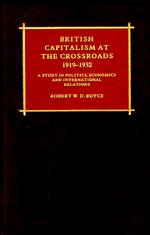 British Capitalism at the Crossroads, 1919–1932
British Capitalism at the Crossroads, 1919–1932 Book contents
- Frontmatter
- Contents
- Preface
- List of abbreviations
- Introduction
- 1 THE POLITICS OF ECONOMIC INTERNATIONALISM
- 2 CRUCIFIED ON A CROSS OF GOLD
- 3 ‘NORMALCY’
- 4 CONFLICT OVER COMMERCE
- 5 THE SCRAMBLE FOR GOLD
- 6 THE SECOND LABOUR GOVERNMENT AT THE HAGUE
- 7 FREE TRADE: THE LAST OFFENSIVE
- 8 THE CHALLENGE OF REGIONALISM
- 9 THE GOLD STANDARD UNDERMINED
- 10 THE AUSTRO-GERMAN CUSTOMS UNION CRISIS
- 11 THE COLLAPSE OF ECONOMIC INTERNATIONALISM
- Conclusion
- Notes
- Bibliography
- Index
8 - THE CHALLENGE OF REGIONALISM
Published online by Cambridge University Press: 05 November 2011
- Frontmatter
- Contents
- Preface
- List of abbreviations
- Introduction
- 1 THE POLITICS OF ECONOMIC INTERNATIONALISM
- 2 CRUCIFIED ON A CROSS OF GOLD
- 3 ‘NORMALCY’
- 4 CONFLICT OVER COMMERCE
- 5 THE SCRAMBLE FOR GOLD
- 6 THE SECOND LABOUR GOVERNMENT AT THE HAGUE
- 7 FREE TRADE: THE LAST OFFENSIVE
- 8 THE CHALLENGE OF REGIONALISM
- 9 THE GOLD STANDARD UNDERMINED
- 10 THE AUSTRO-GERMAN CUSTOMS UNION CRISIS
- 11 THE COLLAPSE OF ECONOMIC INTERNATIONALISM
- Conclusion
- Notes
- Bibliography
- Index
Summary
The tariff truce conference in February–March 1930 was the last major initiative of the second Labour government in its effort to maintain an open world economy. Thereafter, aside from two or three minor forays, it adopted a defensive posture, appealing for ‘economic disarmament’ while obstructing or rejecting proposals that failed to meet its standard of internationalism. To some these were noble efforts to protect the British Empire and world peace, but they contained more of the tragic than the heroic. For it was becoming increasingly apparent that the alternative to regional or other second-best solutions to the crisis was not an open world economy, but economic nationalism with strong overtones of autarky and political extremism. Besides, as fast as the government beat back challenges to economic internationalism abroad, the domestic basis of support for its policy gave way to demands for salvation behind national or imperial tariff walls.
The Briand plan
In March 1928 Jacques Seydoux's reference to a Franco-German entente had led Sir William Tyrrell, then Under-Secretary of State at the Foreign Office, to comment, ‘M. Seydoux is chasing a mirage of longstanding, viz. that economics in the case of France and Germany will overcome race antagonism.’ This reflected the Foreign Office's conviction that German attitudes had changed little since 1914. If scarcely friendly towards France, the Foreign Office did not share the francophobia of the Bank of England, the Treasury, and other centres of internationalism.
- Type
- Chapter
- Information
- British Capitalism at the Crossroads, 1919–1932A Study in Politics, Economics, and International Relations, pp. 241 - 279Publisher: Cambridge University PressPrint publication year: 1988


